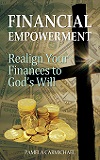Managing Money is a Matter of Faith: 4 Keys to Thrive Financially
“It is not how much you have but what you do with it that matters. If you consistently take positive action with the money you have, it will increase. Managing money is a matter of faith. It’s not only about being practical.” –Pamela Carmichael
When you manage your finances, you are putting your faith to work. You are acting out of the belief that what you are doing will bring increase and be in your best interest. However the opposite is true, archetypally those who don’t manage their finances are either afraid that they will do the wrong thing, they just don’t want to have the responsibility or they lack the knowledge and understanding of how money works.
The Parable of the Talents Jesus spoke to illustrate what the kingdom of Heaven is like is filled with principles of sound money management. It shows what God expects us to do with the money and other resources he has entrusted to us. From this we can learn a few things about money and faith:
What TO DO to Manage Your Money Well
Take Action and Consistent Action
Whatever you have now, is what God knows you have the ability to manage (Matt. 25:15). No matter how little or how much you have make good use of it. If you are not sure how to manage the money you have, the least you should do is start saving. Then take some time to learn about money and as you gain knowledge and seek God for direction, do business with that money.
Immediate action is necessary because as is often said and is true, procrastination is the thief of time and (I will add) of income or financial increase. There is, right now in the world, no such thing as a good time. Now is the time to act. When you don’t take action or delay working on your finances, you get lazy, comfortable and come up with all sorts of excuses why not to do anything. This often leads to the unexpected and undesired loss of your money! So manage it and start now.
But don’t just start and then stop. Managing your personal finances is an ongoing work. You have to keep at it. You have to review what you’ve done, determine if your actions have been profitable or unprofitable and where necessary make adjustments. Reviewing helps you to learn what works and what doesn’t so that as you make adjustments you are improving your possibilities of financial success!
Use What You Have Even If Uncertain Of the Outcome
Managing money is a faith walk. Why? Because as your work, you have no guarantee that what you are doing will be profitable. You don’t have a definitive forecast that your money will increase because of specific actions you may take. One investment or the other may or may not be profitable. This is well said in Eccl. 11: 6 (NLT) “Plant your seed in the morning and keep busy all afternoon, for you don’t know if profit will come from one activity or another—or maybe both.”
Managing money is a matter of faith. Why? If you trust God and seek or ask him for wisdom he will give it to you (James 1:5). However, the Lord’s way of managing doesn’t always fit into the normal way of doing business or managing money. His instructions will put you to the test! You won’t know if what you are doing will work but because the Lord is your guide when you will act on it, He will help you manage well and receive increase.
Think of it, who would have taught that fishing in the day and near the shore would yield such an increase but as Peter obey, he caught more fish than he could handle (Luke 5: 1-11)! And then again, the need for taxes arise and Jesus tells Peter that the first fish he catches is going to give him what he needs to pay the bill (Matthew 17: 27).
What NOT to do to Manage Your Money Well
Don’t be irresponsible
Too often in the body of Christ, we drop the ball in the money game. We either plan but don’t act or we fail on both ends to plan and to take action. Sadly, many of us don’t manage our money and then when life’s troubles come and we have no clue what to do, we cry out to God for help. Please, in love I say this, but we need to stop looking for bail out plans from God.
God is indeed a wonderful Father and Provider and He will provide your need when you don’t see a way out. A testimony of his faithfulness to his children – he has done so for me at times when I had no other help. BUT I have had to learn and develop good and sound financial management skills. I have recognized that he wants me (and you too) to manage well what he has given us and to use it the bring honor to him.
Please, don’t expect that if you mismanage your resources that He will be pleased about it. Yes, He is a loving Father and as He sees your need He will help you but he expects more from you. He wants you to be a productive and creative manager of the money and other resources he has given you so that you will grow – not only financially but in other areas of your life.
God is not pleased with those who don’t even make the effort to manage well. Look at the word of God, the master was angry with the one who did nothing with the money he was given. So angry that he ordered it be taken away from him and given to the one who obviously had managed his well, made a good return and was given a bonus for his work! God is looking for those who are able (and He knows are), and who are action takers. Will you take action with what you have been given?
Don’t let the fear stop you from acting
No matter where you live or what you do, there is uncertainty in the world. Today the stock markets are up, tomorrow they are down; frankly is a yo-yo season each day. Gone are the days of decent interest rates on savings or money market accounts. We are in an era where we have to be creative about how to make our money grow. Nothing is guaranteed but that does not mean you should clam up and do nothing. The benefit or the advantage of you as a Christian is that you have the Lord’s spirit to guide you – you have the Holy Spirit advantage and if you take His lead you will succeed.
Worrying or having fear that you will lose money will likely lead to you losing it! If you don’t act on what you have, the little you have will likely be taken from you in ways you don’t even expect.
Connected to your fear that your will lose money is likely a skewed view of those who are rich. Often times our preconceived ideas of what the rich do or don’t do and how they acquire their wealth hinders our own financial progress. Why? Because we are caught up with judging others even though we don’t know their story. We make generalizations about those who have wealth without knowing them. Instead, we should try to learn from those who excel in money matters and implement the good practices that will yield good results for us.
Benefits of good money management
I know that what I have wrote may be tough to read or accept, but out of love I have shared this. When you manage your money well, you will gain tremendously more than money. I want you to keep these in mind as you take steps to take better care of your finances:
1. God is pleased with you when He looks at how well you manage the money He has given you. God shows his pleasure not only by rejoicing and celebrating with us but by giving us more – prosperity and responsibility.
2. You’ll have less stress. Your well-being – mental, emotional and physical – will be improved. When you manage your money, you understand the intricacies of it – you know what you have and what you don’t, you also know what is coming up – ins and outs. This eliminates wondering and stressing and keeps you in a more restful state. Even when challenging times or unexpected events occur that have a negative impact on your money, you exude confidence not in yourself but in God whose faithfulness you have seen as you practice good money habits.
3. You will have financial increases. There is likely to be increase – more money – as you learn to save and invest your resources and make a return on the investments you makes.
4. You will give freely. It will be easier to give to others because you will have what is needed to help do a good work in someone else’s life
5. Your lifestyle choices will expand. Better money management will lead to improved standard of living with more flexibility to use some of what you have to fulfill life goals e.g. a house, education for yourself or someone else, pay for travel or other life experiences.
6. Your credit ratings will improve. Well managed money opens doors for you to borrow. You will likely find that as you manage and you meet your current obligations in a timely manner – you will have a better credit score and/or lenders will come knocking at your door. That does not mean that you should borrow on a whim. However, it means that if needed esp. for business purposes, the ability to borrow becomes easier.
7. Life planning will be easier. You will be able to make life plans with a little more freedom because you know what you have and you know what you can afford to do. Planning becomes less frustrating and intimidating and you are better able to link your life goals with your financial goals and current resources.
CONCLUSION
God has given you the ability to create wealth and He expects you to manage and increase all that he has given to you. If you practice good money management you will experience financial increase. Therefore, you and I need to do what we have to do – manage our resources, do business and have the faith that as we take action, God will reward and cause our wealth to increase.
Managing Money is a Matter of Faith: 4 Keys to Thrive Financially Read More »









